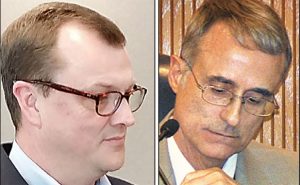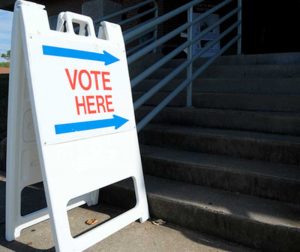Judge orders voting lawsuit appeal parties to Wednesday mediation for settlement
A new wrinkle in the county’s ongoing legal dispute with the NAACP over district voting: The opposing sides have been ordered to a Wednesday meeting to settle their differences.
With only a month remaining before the Nov. 16 scheduled start of a bench trial on the merits of the voting rights case, county officials late last week received an order from U.S. District Court Judge Timothy Batten ordering the parties involved in the suit to move into a mediation phase.
Judge Batten ordered members of the Fayette County Commission, Fayette County Board of Education and the national NAACP Legal Defense Fund and local plaintiffs to meet on Oct. 21.
Batten’s order was puzzling to some in light of the fact that the appellate court has already ordered that the case go to trial. Commission Chairman Charles Oddo called the mediation process “completely new ground” in the case, which actually began before he took office.
As for the mention of a possible settlement conference, the Board of Commissioners has not taken any vote in public session relating to a settlement of this case.
There have been rumors in the community about possible settlement talks, but the board has not discussed the matter in public. Oddo has steadfastly refused to comment on any discussions relating to the ongoing litigation, including discussions in executive session or any speculation from elsewhere about a possible settlement of the lawsuit.
While none of the attorneys representing the county spoke on the record specifically about this case, an order such as Batten’s is not unheard of and it doesn’t mean the trial is off. The parties involved are expected to make an honest effort to resolve their issues during mediation, which could take an entire day or longer, but should neither the mediation nor the settlement conference bring about a resolution the trial will go on as scheduled.
The Board of Commissioners convened the morning of Oct. 19 in a special called meeting and, after allowing public comment for a few minutes, went into executive session. The board returned about 90 minutes later announced that the county would be going to the Oct. 21 mediation session.
There was no vote taken by the commissioners, who simply announced that they would be going to mediation based on the judge’s order. The mediation session is not open to the public.
“We have no choice,” Chairman Charles Oddo said after the meeting. “We’ll go and see where it gets us.”
The Fayette County Board of Education, the second defendant in the case, met in executive session on Oct. 19. Asked after the meeting if the school board had voted on what course to take, Chairman Marion Key said there has been no vote to settle the suit and no vote to mediate.
“The school board didn’t agree to anything. The judge did this. We were told to be there,” Key said.
It was Batten who ordered 20 months ago that the county would hold elections for District 5 using a new gerrymandered map, by which the late Pota Coston and her successor Charles Rousseau were both elected. A federal appeals court threw out Batten’s ruling in January of this year and ordered a bench trial which is scheduled to start in less than four weeks.
Batten’s order, filed Oct. 14, instructed all parties to appear before Steven J. Kaminshine Oct. 21 at 9 a.m. at the federal courthouse in Atlanta.
“If the parties are unsuccessful in their efforts to mediate with Dean Kaminshine, the Court will immediately conduct and preside over a settlement conference in an attempt to resolve all issues in the case,” according to the order. “Each individual party to this case is ordered to appear for the mediation/settlement conference.”
Kaminshine is dean of the School of Law at Georgia State University. His profile on the GSU website lists his areas of legal specialization as civil trial and procedure, constitutional issues of drug testing, employment discrimination, employment law, labor law, sexual harassment law, and trends in legal education. — Also reported by Ben Nelms.












Leave a Comment
You must be logged in to post a comment.